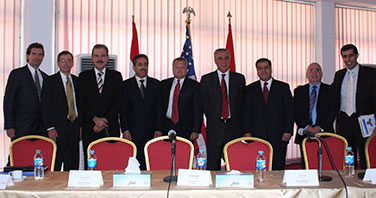|
|
|
||||||||
|
Short Takes: News from the International Trade Administration Commerce Issues First Countervailing Duty Order against China On July 22, 2008, the Commerce Department’s Import Administration (IA) issued its first-ever countervailing duty (CVD) order against China on circular-welded, carbon-quality steel pipe (standard pipe). The CVD order reflects the department’s finding that Chinese imports were subsidized. This order cemented the precedent-setting decision made by IA in March 2007 to reverse a 23-year-old policy of not applying CVD law to non-market economies. (See the April 2007 issue of International Trade Update.) IA’s decision to countervail Chinese subsidies makes available yet another tool for its efforts on subsidies enforcement. Many U.S. industries that complained about being injured by Chinese imports can now seek relief under the CVD law. The United States can offset unfairly subsidized Chinese imports by collecting extra duties. On June 20, 2008, the U.S. International Trade Commission (ITC) found that the domestic industry is materially injured by Chinese exports of standard pipe. U.S. law requires that the Commerce Department and the ITC find dumping or subsidization, as well as injury, before an antidumping duty (AD) or CVD order is issued. Standard pipe from China is now subject to AD rates ranging from 69.20 to 85.55 percent and to CVD duties ranging from 29.57 to 615.92 percent. In five additional CVD cases, the Commerce Department found that other Chinese imports are subsidized. Thus far, the ITC has found injury in two of those cases, and the Commerce Department will soon issue CVD orders on laminated woven sacks and light-walled rectangular pipes and tubes. If the ITC makes additional affirmative injury determinations regarding the other three cases, the Commerce Department will issue more CVD orders. For more information on the orders, visit the “Highlights and News” section of the IA’s Web site.
U.S. Travel and Tourism Industry Posts Gains in 2008 In the first five months of 2008, international visits to the United States rose 11.9 percent and visitor spending increased by 22 percent compared to the same period in 2007. Spending by international travelers while in the United States, including travel receipts and passenger fares, is defined as a U.S. export. Travel and tourism to the United States contributes positively to the overall economy. “The United States continues to be a favorite destination for international travelers,” said William G. Sutton, assistant secretary of commerce for manufacturing and services. “These record-breaking May numbers underscore the strength of the U.S. tourism industry and highlight the economic importance of America’s openness to the world.” Visitations from Canada and Mexico were strong during this period. Canada, the No. 1 country of origin for visitation to the United States, accounted for 7.7 million visits, which represents an increase of 16.8 percent over 2007. Mexico, with 2.5 million visits, was up 4.2 percent. Western Europe also showed strong growth, recording 4.5 million visits, which represents a gain of 16.2 percent. Total visitor spending from all countries during January to May 2008 was $57.4 billion. The International Trade Administration’s Office of Travel and Tourism Industries collects, analyzes, and disseminates international travel and tourism. Visit the office’s Web site to view tables containing detailed data on travel and tourism receipts. Trade Mission Participants Find That Iraq Is Open for Business On June 22–25, 2008, John J. Sullivan, deputy secretary of commerce, led the first official U.S. government trade mission to Iraq in 10 years. Participants from nine U.S. companies visited Erbil in the Kurdistan region of Iraq. The companies represented a broad range of sectors, including agribusiness, franchising, financial services, health care, construction, logistics, and engineering.
Sullivan remarked on the gains already made in the region toward creating a secure and stable business environment, “I’m impressed by the people of the Kurdistan region of Iraq and the remarkable signs of progress in Erbil. Security and stability are increasing. Now is the time for American firms to explore and expand their businesses in this part of the world.” During the four-day mission, delegates participated in more than 75 business-to-business meetings, exploring opportunities for new partnerships, investments, and strategic alliances. Ambassador Charles Ries, U.S. coordinator for economic transition in Iraq, joined the delegation. Participants also met with senior officials from the Kurdistan regional government, including Omar Fatah, deputy prime minister. In an effort to further the ongoing bilateral commercial dialogue between Iraq and the United States, the trade mission participants engaged their Iraqi counterparts in discussions on topics of mutual interest, including creating a corruption-free business environment, enacting policies that favor unhindered trade and investment, and establishing closer economic and commercial ties. Citing the need for U.S. businesses to participate in recent economic gains in Iraq, Sullivan noted that “too few U.S. companies are taking advantage of the favorable opportunities for U.S. goods, services, and investment in this region.” A wide range of services and goods is needed in Iraq. Lucrative opportunities are available to exporters of electrical generation equipment, engineering and design services, franchises, oil equipment, construction equipment, agricultural machinery, aircraft parts, and other industrial goods. For investors, numerous opportunities exist to enter into production and profit-sharing agreements with many of Iraq’s state-owned enterprises and with businesses in the housing, construction, agribusiness, tourism, and other sectors. For more information on commercial opportunities in Iraq, visit the Web site of the Department of Commerce’s Iraq Investment and Reconstruction Task Force at www.trade.gov/iraq.
|
|
